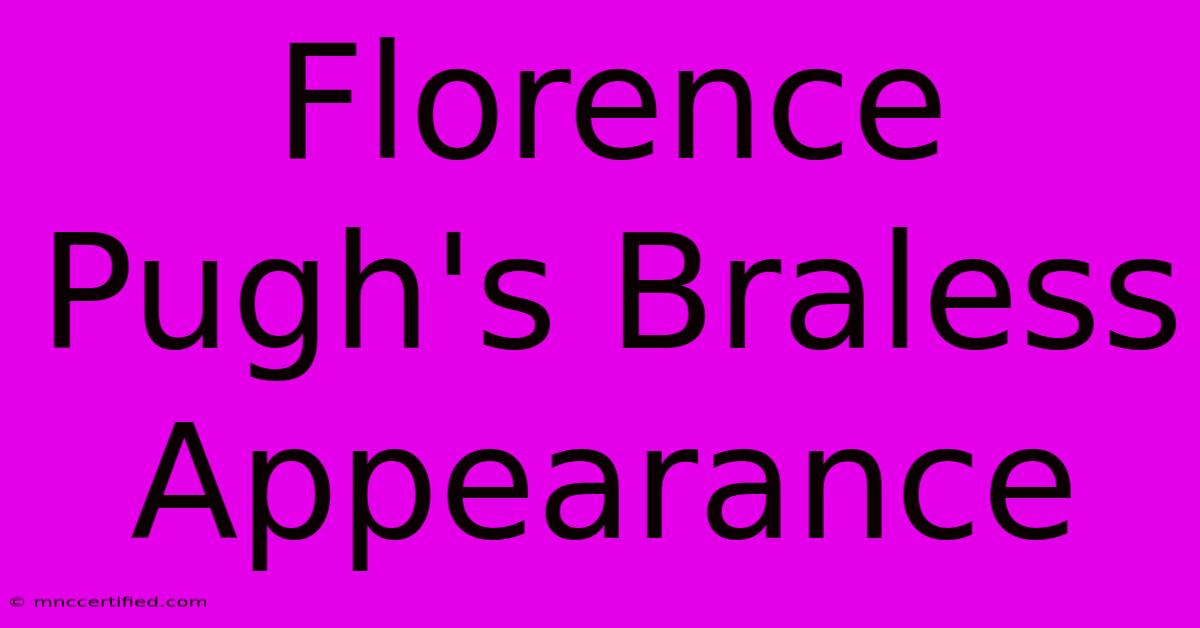Florence Pugh's Braless Appearance

Table of Contents
Florence Pugh's Braless Appearance: A Look at the Controversy and the Conversation
Florence Pugh, a celebrated actress known for her powerful performances and outspoken nature, recently found herself at the center of a social media storm following a braless appearance. This article delves into the incident, exploring the ensuing controversy, the broader conversation it ignited, and its implications for body image and female representation in the public eye.
The Incident: What Happened?
Images and videos circulated online showing Pugh in a seemingly braless outfit. This simple sartorial choice unexpectedly sparked a significant backlash, with many online critics focusing on her lack of a bra rather than her overall appearance or her work. The reaction highlighted the persistent double standards women face regarding clothing choices and bodily autonomy. Many were quick to point out the hypocrisy; men rarely face similar criticism for their clothing choices.
The Outrage and the Backlash: A Double Standard?
The negative commentary focused heavily on Pugh's perceived "inappropriateness," ignoring her undeniable talent and professional achievements. This triggered a wave of support for the actress, with many defending her right to dress as she chooses. The incident underscored a long-standing double standard where women are frequently judged and criticized for their clothing choices in a way men are not. The outcry served as a powerful reminder of the pervasive pressure women face to conform to unrealistic beauty standards and expectations.
Examining the Roots of the Criticism
The criticism leveled at Pugh reveals a deeper societal issue: the ongoing struggle for women's bodily autonomy and the persistent pressure to conform to restrictive norms of modesty and femininity. The focus on her choice of attire, instead of her acting prowess or other accomplishments, highlights the ingrained biases and sexism that continue to plague public discourse. This isn't just about a single photograph; it's about the larger conversation surrounding female representation and the policing of women's bodies.
Florence Pugh's Response and the Power of Advocacy
Pugh herself responded to the controversy with grace and defiance, posting a powerful statement on social media addressing the criticism head-on. Her response exemplified her strong personality and her commitment to challenging societal expectations. This empowered many women to join the conversation, sharing their own experiences with body shaming and challenging the unrealistic beauty standards imposed upon them. Her actions turned the negative attention into a platform for important dialogue surrounding women’s rights and body positivity.
The Broader Conversation: Body Image and Female Representation
Pugh's experience is not an isolated incident. Many women in the public eye face similar scrutiny and criticism regarding their bodies and clothing choices. This incident serves as a potent reminder of the need for a more inclusive and respectful conversation surrounding body image, female representation, and the right to bodily autonomy. The incident highlights the urgent need for a shift in societal attitudes and a greater appreciation for female empowerment and self-expression.
Beyond the Headlines: A Call for Change
The controversy surrounding Florence Pugh's braless appearance shouldn't be dismissed as mere online drama. It's a crucial moment that compels us to examine deeply ingrained societal biases and their impact on women. It serves as a powerful catalyst for change, pushing us to critically evaluate the standards we hold women to and advocating for a more inclusive and respectful culture where women are judged for their achievements, not their clothing choices. The conversation needs to move beyond the headlines and into meaningful action towards fostering a more equitable world.
Keywords: Florence Pugh, braless, controversy, body image, female representation, body shaming, social media, sexism, double standards, bodily autonomy, female empowerment, celebrity, actress, clothing choices, public opinion, online criticism, response, advocacy.

Thank you for visiting our website wich cover about Florence Pugh's Braless Appearance. We hope the information provided has been useful to you. Feel free to contact us if you have any questions or need further assistance. See you next time and dont miss to bookmark.
Featured Posts
-
Astros Acquire First Baseman Walker
Dec 21, 2024
-
Szas Lana Out Now Sos Deluxe Delayed
Dec 21, 2024
-
College Football Tennessee Vs Ohio State
Dec 21, 2024
-
My Beast Games Financial Lessons 5
Dec 21, 2024
-
Smu Vs Penn State How To Watch
Dec 21, 2024